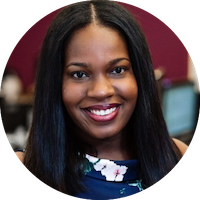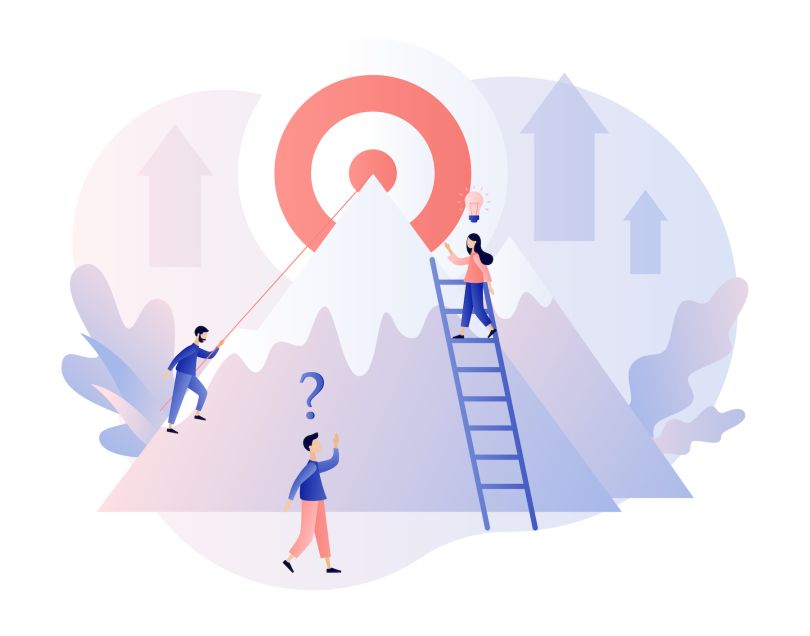Every salesperson remembers the excitement of landing their first deal. For Chantel George, it was also the moment she understood what it means to be a good sales rep.
It was during her second month at Yelp in 2013. She was selling digital advertising to restaurants and had been working closely with a Charleston, South Carolina, restaurant owner. After a series of phone conversations with the owner about the restaurant’s tight margins and struggles to drum up business, George convinced her to buy a digital advertising package for $350 per month to increase her exposure.
“It was then that I was like: I cannot be of service to my customer without understanding fully what they’re putting on the line to do this.”
Once the deal closed, George rang the sales gong and reveled in the congratulatory messages from her colleagues. She felt great about the deal, but as soon as she got home, the weight of the customer’s purchase hit her, and her heart started racing.

“I was so nervous,” George said. “I felt really afraid that I had taken this woman’s life savings, and I wasn’t going to be able to produce anything for her.”
After the deal, George checked in often with the customer and reassured her when she didn’t see an immediate uptick in business. Five months later, George exhaled. An American Idol casting director saw the ad for the restaurant on Yelp and brought the crew in for a meal. It became their go-to restaurant for the duration of their stay in the city.
Before George became a salesperson, she thought the job was an emotionless exercise in pushing the product and doing whatever it takes to close a deal. Her first sale taught her the opposite.
“It was then that I was like: I cannot be of service to my customer without understanding fully what they’re putting on the line to do this. It doesn’t matter if it’s B2B or B2C,” said George, who now works as an account executive at LinkedIn and founded the sales professional network Sistas in Sales. “If you care about people, then you’ll work to make sure that you are doing right by them.”
How to Become a Good Salesperson
- Research the customer to serve as a partner in the transaction.
- Be present during sales conversations and ask follow-up questions.
- Seek out high-performing colleagues for advice. Listening to their sales calls and sharing in their wins can also be a good source of information.
- Learn from your failures. Listen to your own call recordings to improve skills like rejection handling.
- Take the time to update your notes and sales cadences at the end of the day. This prevents deals from slipping through the cracks.
- Build off the momentum of successful deals by selling more. Wait to celebrate until the end of the day.
- Give yourself time to grow.
A Good Salesperson Has a High Emotional IQ
The modern sales process requires a high level of emotional intelligence. The best sales reps know how to listen to the customer. They often understand problems better than customers do, and they operate like a partner in the transaction.
Fortunately, those skills can be learned over time. Here are some steps you can take to develop them.
Research the Client’s Problems

When Jarek Coles started as a sales rep for CB Insights, he thought salespeople needed to be extroverted to thrive. This concerned him because he didn’t think of himself as a very social individual.
To his surprise, the best sales reps at the company tended to be more introverted. What made them successful was their empathy for the buyers. They understood their buyer personas and what people in those positions go through day in and day out, said Coles, who now creates sales training content for SV Academy as a product developer.
While most sales onboarding programs teach new reps what they need to know about their main buyer personas, these programs often only cover the basics. The best reps become students of the buyer personas and industries they sell to, George said.
That means subscribing to industry newsletters, attending webinars and virtual conferences and reading everything that the customer’s CEO puts out. Once you have that base knowledge, it becomes easier to step into the client’s shoes, she added.
Coles found that the more he researched his customers and understood the product he was selling, the more empathetic he could be on sales calls. It allowed him to assist the customer rather than sell to them.
Master the Art of Listening
The best salespeople are also great listeners. But being a great listener in sales requires more than just looking for cues to qualify a prospect or start selling. It’s also about being present with the customer and asking questions.
For George, good listening is taking the time to make sure that what the person is feeling matches up with what they’re saying. She’ll do this with questions like: “It sounds like you might not be happy with this result. Can you tell me more?” Those questions help her signal to the person that she’s trying to understand them and help.
It’s also important to note not just what the person is saying, but how they’re saying it, George said. Sometimes the customer might say everything is fine, but their tone and body language say otherwise.
“It looks bad on you when you don’t get enough information and you make a bold move with gaps in your knowledge.”
George has also learned to listen to her own gut on sales calls. If she doesn’t think she’s gotten enough information from the customer, or if there’s a misalignment, she makes sure to keep asking questions. The point of the conversation isn’t to sell, but instead to understand the customer’s problems well enough to put together a proposal, she said.
“It looks bad on you when you don’t get enough information and you make a bold move with gaps in your knowledge,” George said. “So it’s listening to what they’re saying and listening to yourself. Making sure you’re aligned with your gut is important.”

A Good Salesperson Is Always Looking to Improve
George is tired of hearing that salespeople need to be competitive. The concept turns the job into a selfish exercise, in which reps are out to one-up each other and hoard information that others might find useful. That mindset bleeds into sales calls, leading to reps who are focused on their own needs instead of those of the customer.

One of the most valuable traits a sales rep can have is humility, Richard Harris, who runs the sales consulting firm The Harris Consulting Group, argued. Learning from other sales reps and from failed deals is critical to finding success. That can’t happen if the focus is only on winning.
Here’s what a rep needs to do to grow in their role.
Seek Advice From Your Colleagues
Success in sales is all about fine-tuning your process, and the best way to do that is to learn from other sales reps.
While Harris has been a sales consultant for seven years, he always makes sure to ask other sales leaders he’s training about their sales strategies and tactics. Often, it creates an opportunity to learn something new.
The first step is to start reading sales blogs and engaging in networking groups, Harris said. He also suggests asking top performers what books they’ve found helpful in their careers, what mistakes they’ve made and who they’ve learned from. Those insights can serve as a useful jumpstart to advance your career.
Studying the call recordings of other reps can also reveal new sales strategies. Listen for what it sounds like when there’s agreement or disagreement, as well as what questions the rep is asking, Harris said. Whether you’re a veteran rep or just starting out, those calls can teach you new ways to frame the product, handle rejections or ask questions.
Meanwhile, sharing your wins and hearing about the successful sales of others helps boost the morale of the entire team, George said. If the team isn’t sharing those wins, seek them out. They can reveal a new problem the product solved and serve as inspiration to get back on the phone for your next call.
Learn From Your Failed Deals
Failure is a part of the job in sales. While being able to persevere through dropped deals is critical, it’s just as important to have the self-awareness to listen back to those recordings and improve.
Just like an athlete reviews game tape, studying past sales calls can reveal bad habits and holes in your approach.
“The theme was that I didn’t understand the client well enough, and I made some assumptions, and it backfired.”
Early in George’s career, she had a manager who told her to write down every question she asked during a sales call. The exercise helped her recognize that, on unsuccessful calls, she’d only asked three questions.
“The theme was that I didn’t understand the client well enough, and I made some assumptions, and it backfired,” George said. “I thought I had enough data to go off of to not listen as much.”
Coles would often take notes on how he responded to objections, listening for how his voice sounded and the speed of his speech. He discovered that he subconsciously spoke faster when a customer asked him questions or voiced an objection. Eventually, he was able to improve his objection handling, which helped him exceed quota every month at CB Insights.
Ultimately, taking the time to listen to deals gone wrong may be painful, but they’re also a rich source of information that can help you win next time.
A Good Salesperson Does the Little Things Between Sales
As sales becomes more tech- and data-driven, being successful requires more than just being a good talker. It’s also about mastering the tech stack and examining the data to understand the best time to cold call customers and what time to send email outreach.
Taking the time to document sales and reflect on the data gives reps an edge in netting a sale. In some cases, it’s the missing link between hitting quota and falling short in a given month.
Invest Time in Organizing Your Sales Process
One of the first things Coles did when he started out as an SDR at CB Insights was to get coffee with each top-performing sales rep and find out what they did to exceed their quotas every month. Their secret: organization.
For Coles, that meant starting with how he structured his days. He figured out what times of day he was most energized and then built his outreach schedule around that. This made his workflow more efficient.
“I probably had three deals over $75,000 that I was able to close because I reached back out to them and eventually caught them at the right time.”
Sales is also a nurturing process that requires frequent follow-ups with customers to even arrange a meeting. That’s why maintaining an organized inbox and an up-to-date sales engagement platform is key. It can prevent deals from falling by the wayside and notify you when to check back in with prospects.
Coles made sure to spend time at the end of each day logging his outreach activity and reviewing his next steps for clients. Those notes paid off, ensuring he never missed an outreach opportunity and was able to revisit clients who initially passed because of timing.
“I probably had three deals over $75,000 that I was able to close because I reached back out to them and eventually caught them at the right time,” Coles said.
Ride the Momentum After a Successful Deal
When a sales rep closes a deal or arranges a meeting, there’s a tendency to celebrate and coast for the rest of the day. Resist that temptation, Harris said.
The best sales reps build on the momentum of a successful engagement. In that moment, the endorphins are flowing and focus has peaked, which could lead to a streak of deals. Stepping away to celebrate breaks that concentration and makes it harder to build on success, Harris said.
“When things go well and you change something, that creates a slump.”
It’s also important to know what worked in a deal and stick with it until it stops working. Sales is all about making tweaks to the pitch to attract a customer, but once something is working, it’s important to resist that tendency.
“When things go well and you change something, that creates a slump,” Harris said. “Don’t change your pitch or make your demo 28 minutes instead of 30. Do every single thing the same.”

A Good Salesperson Takes Time to Grow Into the Role
If there’s one tip George would give to other sales reps, it’s to have patience. It takes time to build the sales muscle.
Early sales conversations will be awkward. She still remembers how out of her depth she felt trying to give advice to restaurant owners about an industry in which she’d never worked. Over time, however, she became more confident on those calls.
“Every year is another year that I’ve dealt with my clients and issues, and it makes me feel more content.”
That came from doing research, looking for ways to improve and doing the job day in and day out, George said. Eventually, there came a point when she started to recognize the same patterns in customer problems and know how to solve them. She now measures her success based not on how many deals she can close, but on the quality of customer relationships she’s built.
Ultimately, she learned that there is no shortcut to becoming a master sales rep. Success just takes time.
“Every year I feel more settled and grounded,” George said. “Every year is another year that I’ve dealt with my clients and issues, and it makes me feel more content. You’ll get to that place, but it will not happen immediately.”




